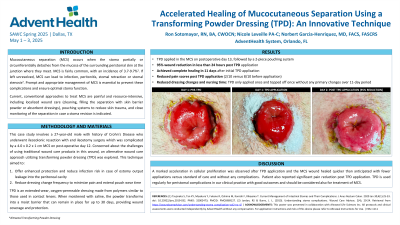Practice Innovations
(PI-041) Accelerated Healing of Mucocutaneous Separation Using a Transforming Powder Dressing: An Innovative Technique

Mucocutaneous separation (MCS) occurs when the stoma partially or circumferentially detaches from the mucosa of the surrounding peristomal skin at the junction where they meet. MCS is fairly common, with an incidence of 3.7-9.7% 1. If left unresolved, MCS can lead to infection, peritonitis, stomal retraction or stomal stenosis2. Prompt and appropriate management of MCS is essential to prevent these complications and ensure optimal stoma function. Current, conventional approaches to treat MCS are painful and resource intensive, including localized wound care (cleaning, filling the separation with skin barrier powder or absorbent dressings), pouching systems to reduce skin trauma, and close monitoring of the separation in case a stoma revision is indicated.
Methods:
This case study involves a 27-year-old male with history of Crohn’s Disease who underwent ileocolonic resection with end ileostomy surgery which was complicated by a 4.0 x 0.2 x 1 cm MCS on post-operative day 12. Concerned about the challenges of using traditional wound care products in this wound, an alternative wound care approach utilizing transforming powder dressing (TPD) was explored. This technique aimed to 1) offer enhanced protection and reduce infection risk in case of ostomy output leakage into the peritoneal cavity, and 2) reduce dressing change frequency to minimize pain and extend pouch wear time. TPD is an extended-wear, oxygen-permeable dressing made from polymers similar to those in contact lenses. When moistened with saline, the powder transforms into a moist barrier that can remain in place for up to 30 days, providing wound coverage and protection.
Results:
On postoperative day 13, TPD was applied in the MCS, followed by a 2-piece pouching system. Less than 24 hours after TPD was applied, the wound had reduced by 95% and achieved complete healing 11 days after initial TPD application. TPD was only applied once and topped off once without any primary dressing changes.
Discussion:
A marked acceleration in cellular proliferation was observed after TPD application and the MCS wound healed quicker than anticipated, without any complications. . TPD has been used for other peristomal complications with good outcomes and should be considered also for treatment of MCS.

.jpg)